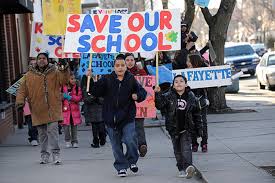The proposal to create an all-choice zone in East Nashville is concerning. For the past decade, I have studied New Orleans, the nation’s first all-charter school district. The attempt to turn around neighborhood schools by closing them and opening charters caused greater harm than Hurricane Katrina. I fear the same destructive «reforms» will strike Nashville.
In 2005, Louisiana’s state-run Recovery School District (RSD) assumed control of most public schools in New Orleans and handed them over forprivate management and profit making by «nonprofit» charter school operators.
Experienced veteran teachers in New Orleans were unlawfully fired and replaced by transient, inexperienced recruits from beyond the city, with most departing after two years. Teach For America stood ready to supply new teachers. Most of all, it stood to profit.
Neighborhood schools were closed without genuine community input. Meanwhile, charter school operators have paid themselves six-figure salaries, used public money without transparency and appointed unelected boards to govern the schools.
Community members have filed civil rights lawsuits, including one by Southern Poverty Law Center alleging thousands of disabled children were denied access to schools and federally mandated services in violation of the Individuals with Disabilities Education Act. Moreover, there are charter schools in New Orleans with out-of-school suspension rates approximating 70 percent.
Charter school operators in New Orleans do not care about children — they care about making money. They do not want to serve children who are «expensive» or may compromise the business venture.
The plan developing in Nashville follows the New Orleans model.
In 2010, New Schools for New Orleans (NSNO), the city’s leading charter school incubator, received a $28 million federal grant to expand charters in New Orleans as well as Nashville and Memphis. NSNO worked with Louisiana’s RSD and Tennessee’s Achievement School District (ASD), designed after the RSD, to «scale» the model in urban areas beyond New Orleans.
Around this same time, Mayor Karl Dean and Director of Schools Jesse Register welcomed the newly formed Tennessee Charter School Incubator (TCSI). TCSI was led initially by Matt Candler, NSNO’s former CEO, and planned to launch 20 new charter schools in Nashville and Memphis within five years.
In 2012, NSNO published the report «New Orleans-Style Education Reform: A Guide for Cities» to disseminate advice on replicating New Orleans’ all-charter model. ASD superintendent Chris Barbic contributed insights to NSNO’s guide with TCSI’s Justin Testerman and Greg Thompson. Louisiana Sen. Mary Landrieu, NSNO’s ally, hosted a forum in Washington, D.C., on the guide. Landrieu co-chairs the Senate Public Charter School Caucus with Tennessee Sen. Lamar Alexander.
Register also signed the District-Charter Collaboration Compact, an agreement between traditional district schools and charter schools to work together. New Orleans is a key contributor to this Gates Foundation-supported collaboration.
Register’s open letter says education officials are «coming up with new ideas» to solve Nashville’s problems. The ideas are not new; they were incubated in New Orleans. The plan is not in «early stages of development»; charter school entrepreneurs have been laying groundwork for years. The task force formed and «big news» dropped before community input was invited. In New Orleans, schools were seized and chartered before communities returned to the city.
«Charter Schools, Race, and Urban Space: Where the Market Meets Grassroots Resistance» chronicles the injustices resulting from charter expansion in New Orleans. Citizens concerned about the future of Nashville’s public schools may find the book illuminating.
We need to address the root causes of struggling urban schools: ongoing state disinvestment in black and brown children. Privatizing public schools will never do this.
El link original es: http://www.tennessean.com/story/opinion/2014/10/01/east-nashville-following-new-orleans-lead-schools/16487057/






 Users Today : 103
Users Today : 103 Total Users : 35459569
Total Users : 35459569 Views Today : 163
Views Today : 163 Total views : 3417921
Total views : 3417921